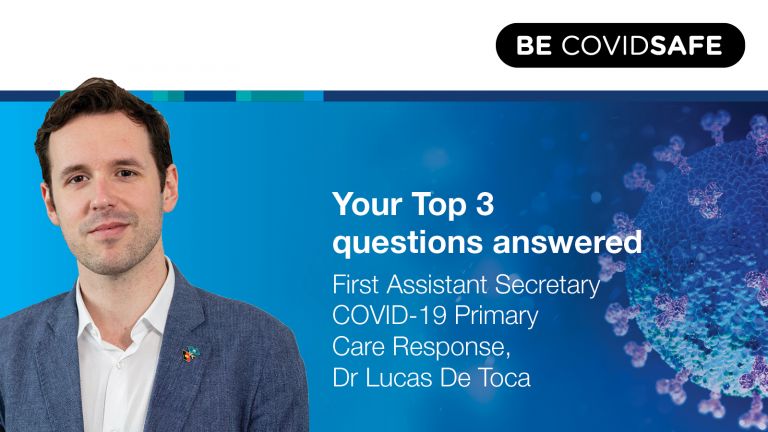
Good morning.
I am Dr Lucas de Toca and I lead the roll-out of the vaccine through general practice for the National COVID vaccine task force.
ACT Health recommends people wear masks inside but acknowledges that for situations in which, for diction or communication, it is important to see the person's mouth and it is OK to take it off.
That is why Linda and myself will take it off for this segment.
Thanks, Linda.
Today I will answer your top three questions that have come through social media channels hopefully with answers you're looking for.
My shout-out today goes to the Aboriginal community controlled health services around Australia delivering their vaccines to their communities and the nearly 100,000 Aboriginal and Torres Strait Islander people who have received at least one dose of the vaccine already.
It is NAIDOC Week this week, so I want to acknowledge we are in the land of the Ngunnawal people.
Dhawra nhuna, dhawra Ngunawal. Yanggu gulanyin ngalawiri, dhunayi, Ngunawal dhawra.Wanggarralijinyin mariny balan bugarabang.
Let's go to your questions.
Siobhan first question, our children more at risk of catching the data COVID-19 strain? -- Delta.
It has become apparent that the Delta strain is far more transmissible than the original virus and even more so than some of the other more transitional -- transmissible stains like the alpha strain identified in the UK.
It is understand the strains or anything between 40 and 60% more transmissible than the original virus and that is seen across all age groups including children.
What we have seen in other countries overseas were a significant proportion of the adult population has been fascinated is we have seen a proportionately higher number of cases in younger people in general than in the first, second and third ways.
Whether it is more transmissible in children or a product of the adult population has had the virus or have received the vaccine but it is clear it is more transmissible in all age groups.
Encouragingly, it does not seem these new strain -- this strain causes more severe COVID.
We are not seeing worse outcomes from it than the original strain of the virus.
As with the original strain, COVID-19 and the risk of severe disease from COVID-19 dramatically increases with age and that is why it is so important that all the people around us are 1st to be protected with vaccines against COVID-19.
The second question - I'm over 60 years of age.
If I speak to my GP, to our choice of which vaccine I can receive?
The Australian Technical Advisory Group on Immunisation, ATAGI has provided advice on the preferential use of Pfizer under 60.
The AstraZeneca vaccine is approved everyone 18 years and over but ATAGI recommended it is best used in people 60 and over because of the benefits (inaudible) and there are a limited number of specific circumstances that mean a person 60 and over cannot receive or is not encouraged to receive an AstraZeneca vaccine.
There is a small number of very specific clotting conditions, so not your average thrombosis or clotting event, not any person who has had DVT.
We are talking about a small list of very specific, generally immune-mediated thrombotic events or clotting conditions and that list can be found on the Department of Health's website and any person who has had a severe adverse reaction to the first dose of AstraZeneca vaccine, like anaphylaxis or a severe reaction or thrombosis or TTS, they are encouraged not get a second dose of the AstraZeneca vaccine.
For everyone else of any age who has received the first dose, they are strongly encouraged to receive the second dose of the AstraZeneca vaccine when due and for everyone else 60 and over, the AstraZeneca vaccine is available to you, noting of course younger people can also get it if they choose to do so after a decision on risk and benefit and informed consent with the health provider.
Ultimately talk to health practitioner to understand your specific conditions or circumstances mean in terms of conditions that involve contraindications.
And finally, can my workplace make it mandatory to have the COVID-19 vaccine?
So, this is very topical because in the last week the National Cabinet agreed it would make it mandatory for people working in residential aged care facilities, those workers to receive the vaccine and that mandate will come into effect in September requiring workers in residential aged care facilities to have the vaccine.
It is important we protect our most vulnerable.
COVID is more severe in older people and their situation of congregate living makes their risk higher and protecting the health care… The aged care workers themselves, not only provides that direct protection to the work about an additional layer of protection to the residents in those facilities.
That's why making them mandatory vaccination is happening with aged care workers.
It has a lack of a couple of months so everyone has a chance to receive the vaccine.
In some states and territories, other frontline workers like people working in quarantine support situations Orane hotels may be required to receive the vaccine.
The fair work website has information on that if you are interested.
Those are today's questions.
Thank you for watching and continuing to engage the channels to submit your questions.
We review them every time and respond in each segment.
Thank you for remaining COVID Safe, enjoy NAIDOC Week and take your time to acknowledge and celebrate the success of your First Nations colleagues, family members and anyone watching.
Go and get a vaccine if it is offered to you.
Top 3 questions
- Are children more at risk of catching the Delta COVID-19 strain?
- I am over 60 years of age, if I speak to my GP do I have a choice of which vaccine I can receive?
- Can my workplace make it mandatory to have the COVID-19 vaccine?







